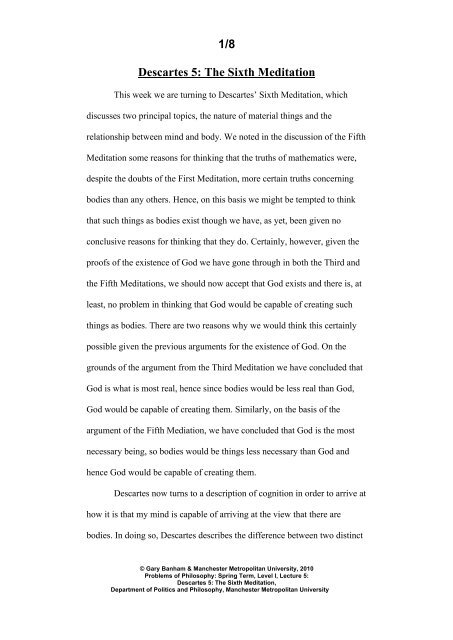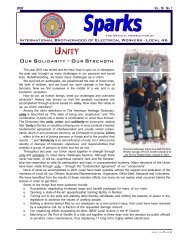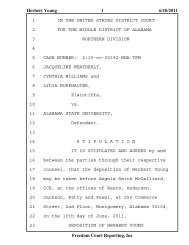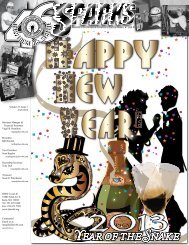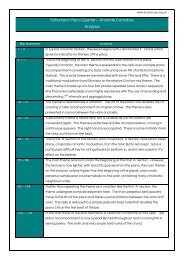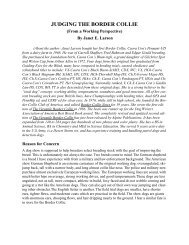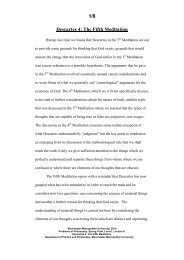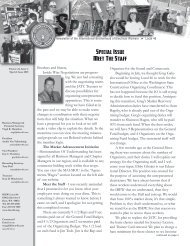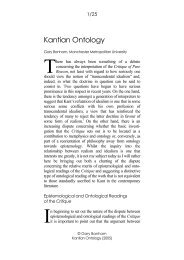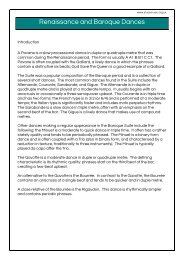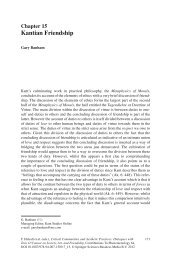1/8 Descartes 5: The Sixth Meditation - Gary Banham
1/8 Descartes 5: The Sixth Meditation - Gary Banham
1/8 Descartes 5: The Sixth Meditation - Gary Banham
You also want an ePaper? Increase the reach of your titles
YUMPU automatically turns print PDFs into web optimized ePapers that Google loves.
1/8<strong>Descartes</strong> 5: <strong>The</strong> <strong>Sixth</strong> <strong>Meditation</strong>This week we are turning to <strong>Descartes</strong>’ <strong>Sixth</strong> <strong>Meditation</strong>, whichdiscusses two principal topics, the nature of material things and therelationship between mind and body. We noted in the discussion of the Fifth<strong>Meditation</strong> some reasons for thinking that the truths of mathematics were,despite the doubts of the First <strong>Meditation</strong>, more certain truths concerningbodies than any others. Hence, on this basis we might be tempted to thinkthat such things as bodies exist though we have, as yet, been given noconclusive reasons for thinking that they do. Certainly, however, given theproofs of the existence of God we have gone through in both the Third andthe Fifth <strong>Meditation</strong>s, we should now accept that God exists and there is, atleast, no problem in thinking that God would be capable of creating suchthings as bodies. <strong>The</strong>re are two reasons why we would think this certainlypossible given the previous arguments for the existence of God. On thegrounds of the argument from the Third <strong>Meditation</strong> we have concluded thatGod is what is most real, hence since bodies would be less real than God,God would be capable of creating them. Similarly, on the basis of theargument of the Fifth Mediation, we have concluded that God is the mostnecessary being, so bodies would be things less necessary than God andhence God would be capable of creating them.<strong>Descartes</strong> now turns to a description of cognition in order to arrive athow it is that my mind is capable of arriving at the view that there arebodies. In doing so, <strong>Descartes</strong> describes the difference between two distinct© <strong>Gary</strong> <strong>Banham</strong> & Manchester Metropolitan University, 2010Problems of Philosophy: Spring Term, Level I, Lecture 5:<strong>Descartes</strong> 5: <strong>The</strong> <strong>Sixth</strong> <strong>Meditation</strong>,Department of Politics and Philosophy, Manchester Metropolitan University
2/8elements of the mind: the imagination and the understanding. Imaginationinvolves setting figures before my mind in addition to purely conceiving ofthem. Whilst imagination adds to the thoughts of things some picture orrepresentation of them it is not clearly a necessary part of my mind.Imagination seems to depend on something beyond me whilst understandingbelongs to my inmost notion of myself. In understanding something Isimply turn over thoughts in my mind whilst in imagining I turn towardsbodies and their qualities.If we look at the data of sense there is added to the fact of theappearances of things that I am not in control of the receipt of theirimpressions. I cannot decide when or where to see or hear the things I see orhear. This is clearly one of the sources of my belief that things that appear tobe beyond me really are beyond me in the way they appear to be. We canadd to this the fact that the use of the senses comes earlier to us in time inour existence than the use of reason which leads us to naturally suppose thatideas depend on the data of the senses and this gives another reason why wetend to believe the data of the senses. However, more important than eitherof these reasons as a view that I have that there exist such things as bodies isthe attachment I have to my own body. I cannot be separated from it andwhen things are done to it (such as someone or something coming intocontact with it) I immediately feel sensations of pleasure and/or pain. Thislast point is connected by <strong>Descartes</strong> to what he terms the “teachings ofnature” such as the pangs of hunger I feel where a particular sensation leads© <strong>Gary</strong> <strong>Banham</strong> & Manchester Metropolitan University, 2010Problems of Philosophy: Spring Term, Level I, Lecture 5:<strong>Descartes</strong> 5: <strong>The</strong> <strong>Sixth</strong> <strong>Meditation</strong>,Department of Politics and Philosophy, Manchester Metropolitan University
3/8me apparently automatically to make certain kinds of judgment such asneeding to sustain myself by means of food.However, to these points all of which help to explain my belief inthe existence of bodies and not least to my belief in the existence of my ownbody <strong>Descartes</strong> adds some points that remind us again of the problems withsensory data. We have had many occasions of perceptual confusion whereobjects appeared to us from a certain distance to have a shape which, whenapproached more closely, they did not have and similarly people can sufferpain when there is no limb to which it belongs (phantom limb). <strong>The</strong> First<strong>Meditation</strong> also added to these reasons for doubting sensory knowledgeother factors such as the problem concerning dreaming, a problem which wewere reminded of again in the Third <strong>Meditation</strong> even affects the evidence ofindependence of bodies since bodies appear to us to be independent of uswhen we encounter them in dreams and yet they are not independent of usin such a case but rather dependent on us.After having looked at these problems <strong>Descartes</strong> now invokes againthe existence of God pointing out that if I can conceive two things as clearlyand distinctly separate from each other this is a reason in itself why they arelikely to be distinct from each other since if I can conceive them as distinctthen God would have the power to make them so. Hence if I can conceive ofmyself as essentially being a thinking thing then since in thought I canseparate my mind from my body and come to see that my essential natureseems to reside in thought then it is conceivable that God could lead me toexist purely mentally without attaching a body to me. <strong>The</strong> thinking thing© <strong>Gary</strong> <strong>Banham</strong> & Manchester Metropolitan University, 2010Problems of Philosophy: Spring Term, Level I, Lecture 5:<strong>Descartes</strong> 5: <strong>The</strong> <strong>Sixth</strong> <strong>Meditation</strong>,Department of Politics and Philosophy, Manchester Metropolitan University
4/8that I can conceive myself to me has no properties in itself that are part ofbodies but is rather entirely distinguishable from bodies.<strong>The</strong>se considerations give a basis for thinking of mind as somethingdistinct in principle from body. However the nature of body itself and myreasons for believing in it still need clarification. In addition to the capacityto think (which we can identify with understanding) we do also have thecapacity to receive sensory impressions (which we can relate to theimagination). Since the impressions in question are generally producedwithout my will being involved the presence of them before me suggeststhat I am dependent on something that is beyond me. This will either be thesupposed bodies themselves, or God, or something else that is intelligiblerather than sensible. But since we have established that God is not adeceiver he would not give me the impression that the bodies were the causeof my impressions unless this was true. However we might wonder at thispoint why we should believe that the effect accurately portrays the causegiven, as <strong>Descartes</strong> has told us earlier, that even if the idea of the thingcomes from the thing this does not prove that it gives us the correct notionof the thing. (Example of the sun). In response to this problem <strong>Descartes</strong>points to the way my nature assures me of the fact that I have a bodythrough the sensations of hunger and thirst we have already mentioned.When we attend to the nature of our connection with our own bodies we areforced to the conclusion that we do not merely inhabit them but are closelyintermingled with them which is why it is not merely our body that feelspain but we that do so. This suggests that there is a “real union” between our© <strong>Gary</strong> <strong>Banham</strong> & Manchester Metropolitan University, 2010Problems of Philosophy: Spring Term, Level I, Lecture 5:<strong>Descartes</strong> 5: <strong>The</strong> <strong>Sixth</strong> <strong>Meditation</strong>,Department of Politics and Philosophy, Manchester Metropolitan University
5/8mind and our body. This element of our awareness also points us to theexistence of other bodies than our own as these other bodies are the sourceof the pains and pleasures of our own.What is the cause, therefore, of the fact that I seem to be deceived bythe senses when these senses are part of the ordered system of things createdby God? Sensory perceptions inform me in a broad way about what will bebeneficial or harmful for my body. But such perceptions are not themselvesreliable touchstones for the existence of things except when combined withthe mental activity of judgment. It is judgment that has to be used todescribe whether sensory impressions are correct in any given instance ornot and hence it is not really the sensory impressions as such that aremistaken but my mental relation to them which may simply involve myfailing to think about what would be reliable in any given sensoryimpression.This argument may however seem insufficient in relation to caseswhere the sensory impression I am given is that something is beneficial tome when it wouldn’t be so. An example would be a pleasant tasting poison.However, the reason why I am deceived in this case, is that my knowledgeis not all encompassing so I am not aware of the poison contained within thepleasant tasting food. Or, take the example of dropsy, where a sicknessproduces a dryness in my throat so that I long to drink when drinking wouldin fact make me more sick. In this instance it appears that nature produces inme a longing to do the reverse of what would be good for me. How doesGod allow this to take place if he is the author of an ordered system?© <strong>Gary</strong> <strong>Banham</strong> & Manchester Metropolitan University, 2010Problems of Philosophy: Spring Term, Level I, Lecture 5:<strong>Descartes</strong> 5: <strong>The</strong> <strong>Sixth</strong> <strong>Meditation</strong>,Department of Politics and Philosophy, Manchester Metropolitan University
6/8In replying to this objection <strong>Descartes</strong> says more about thedifference between mind and body. Whilst body is something that can bedivided into parts, mind is not, it is, rather, indivisible. Parts of the body canbe taken away without the mind being affected in its operation by this. Nextthe mind is not affected by all parts of the body equally but mainly by thebrain. Parts of the body can be affected in the same manner by distinctimpressions operating on them and coming from different parts of thenerves and fibres. Whilst the reason why a particular sensation is felt in aparticular part of the body can have innumerable causes the signal to thebrain that has relation to the mental state is that which is produced by themost likely physical cause that operates in the majority of cases. Since thecomplexity of the physical interplay is best regulated by a mechanism likelyto produce the most plausible impression in the mind of what has occurredin the body the best set of physical arrangements is all the same likely toproduce mistaken impressions in some cases, mistakes however which stillare based on my own judgment in relation to the well regulated machinerycreated by God.<strong>The</strong> result of this explanation is to help to resolve the scepticaldoubts about the nature of the senses. <strong>The</strong> senses themselves do not deceiveme; my judgments concerning them are what are false. My senses report thecorrect state of affairs more often than not as they follow a regulated patternset by God. With regard to the difference between sleeping and wakingthere are many good criteria for distinguishing between them, criteria whichare usually right even if wrong in a given instance. <strong>The</strong> key way in which© <strong>Gary</strong> <strong>Banham</strong> & Manchester Metropolitan University, 2010Problems of Philosophy: Spring Term, Level I, Lecture 5:<strong>Descartes</strong> 5: <strong>The</strong> <strong>Sixth</strong> <strong>Meditation</strong>,Department of Politics and Philosophy, Manchester Metropolitan University
7/8<strong>Descartes</strong> now suggests we can and do distinguish sleeping from waking isthat in the case of waking experience the elements of it are all connectedtogether by means of memory whilst this does not occur in sleep betweenthe variant experiences I call dreams. Not only is there continuity betweenwaking experience of a type denied to sleeping experience but also, giventhe axiom of God’s truthfulness, I have no reason to dismiss this as a reasonfor thinking that the waking world is so distinct from the sleeping one.Furthermore, the senses are capable of being checked and guided by theintellect and memory. <strong>The</strong> intellect, with its capacity for perceiving clearand distinct ideas, enables a correct relation to the senses to be formed. Thisis solidified by the data of memory.Thus <strong>Descartes</strong> attempts to resolve his doubts in order: firstly heremoves the doubt concerning the evil demon by demonstrating theexistence of God. <strong>The</strong> existence of God guarantees in its turn that my doubtsconcerning mathematical qualities must be false as the only reason I had fordoubting the operation of my intellect with regard to them concerned theevil demon. Next I am able to resolve my doubt concerning dreaming bydemonstrating that the coherence of experience is guaranteed by the cooperationof my memory, my senses and my intellect. <strong>The</strong> only doubt that isnot removed entirely concerns the reliability of the senses. It remainsimportant to <strong>Descartes</strong> that the evidence of the senses should be subordinateto that of the intellect as by means of this subordination he is able to showthe need for the concepts of pure understanding to correct and improve onthe data of imagination. By this means he assures us of the need for science© <strong>Gary</strong> <strong>Banham</strong> & Manchester Metropolitan University, 2010Problems of Philosophy: Spring Term, Level I, Lecture 5:<strong>Descartes</strong> 5: <strong>The</strong> <strong>Sixth</strong> <strong>Meditation</strong>,Department of Politics and Philosophy, Manchester Metropolitan University
8/8as science also overcomes the data of the senses in favour of deductionsfrom set-out demonstrations (remember here the case of the sun, animportant contemporary example for <strong>Descartes</strong>).<strong>The</strong>re are hence three questions that emerge from this weeks lecture:1) has <strong>Descartes</strong> successfully resolved his sceptical doubts? 2) has <strong>Descartes</strong>got good reasons for his assertion that mind and body are distinct from eachother? 3) does <strong>Descartes</strong> successfully address the problem of misleadingdata from the senses given his assumption that God is truthful?© <strong>Gary</strong> <strong>Banham</strong> & Manchester Metropolitan University, 2010Problems of Philosophy: Spring Term, Level I, Lecture 5:<strong>Descartes</strong> 5: <strong>The</strong> <strong>Sixth</strong> <strong>Meditation</strong>,Department of Politics and Philosophy, Manchester Metropolitan University


